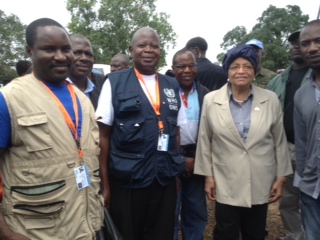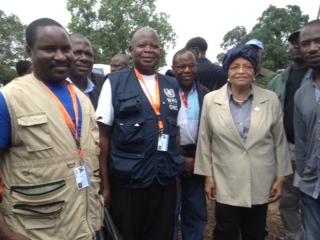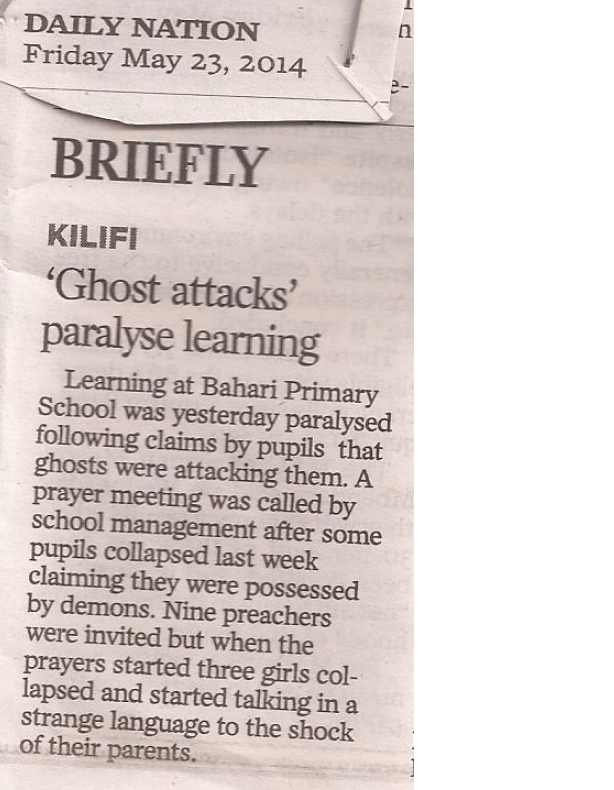
Ebola Heroes
It is amazing how every crisis has a hero who puts their own interests down for the sake of another. Ebola is no different. Whereas most of us would rather be miles away from the infection, there are people who cannot sit around, reading about it in the paper while other human beings suffer. The world media has focused attention on the efforts of Samaritan’s Purse and Medecins Sans Frontier. Well deserved praise of people from outside the continent, who knowing the risks involved, travelled to help the very sick and dying.
But not much attention has been shone on a group of Ugandans working on the front line in the Ebola zone. In Liberia is a team of Ugandans working on case management, epidemiology, surveillance and monitoring. The efforts of the Ugandans have been so appreciated by the Liberians, that Dr. Victor Tugumizem and Dr. Okech Joa have been granted honorary citizenship of Liberia by H.E President of Liberia Ellen Johnson Sirleaf in recognition of the tremendous work they have done in Margibi County.
More Ugandan health workers have been arriving into Liberia to assist them with the epidemic and because they are coming into the country under the auspices of the World Health Organization, their contribution has gone unnoticed until recently when an article was posted on the WHO website about their efforts.
http://www.who.int/en/
Uganda has the experience of handling an Ebola outbreak in their own country very effectively in the past. They are well aware of the problems they will encounter and are willing to be the hand that leads the Liberians out of their crisis.
I hope to be able to give a better account of the Ugandans working on the frontline once I can establish some contact with them.
So, how is the epidemic proceeding?
In the most recent Disease Outbreak News on Ebola from the WHO on 28th August , there were 3,069 cases and 1,552 deaths. The fatality stands at 52% ranging from 62% in Guinea to 42% in Sierra Leone. Those people infected early in the epidemic and those who live in its epicentre continue to have the highest mortality. Those living further away from Guinea have better chances of survival – and I hazard a guess that since the virus has travelled through many people, it has continued to lose its virulence, or deadliness over time.
However, although the virus may be losing its deadliness a bit, but its ability to spread has rocketed. Before this outbreak, Ebola epidemics have been easily contained. At the time of the WHO report on the 28th of August, the outbreak was restricted to Guinea, Liberia, Nigeria and Sierra Leone. As of 30th August, there was a case of Ebola reported in Senegal.
The WHO reported the story in http://www.who.int/csr/don/2014_08_30_ebola/en/
In brief, a 21- year old man, native of Guinea, travelled by road to Dakar, Senegal and stayed with relatives in the outskirts of the city. He arrived on 20th August but by 23rd started feeling unwell. He sought medical care, was given malaria treatment and returned to his relative’s home. Three days later, he still had the symptoms of malaria, so they took him to an infectious disease hospital where he was admitted.
Around this time, an alert from authorities in Guinea who were tracing an Ebola contact reached Senegal. The alert warned that a close contact to an Ebola case had escaped their surveillance system. A search for the contact was launched.
The man was finally traced. I am curious to know whether he run away from Guinea believing that he would escape the virus by being as far away as possible from the disease whose potential to kill he must have observed. I can only hope that he has not already infected the relatives he stayed with during the early phase of his illness.
In the meantime, the WHO informs us that there is now a separate outbreak in the Demographic Republic of Congo (DRC) with a case confirmed on the 26th August. This single case has evolved to over 20 cases in the last few days. The WHO assures the world that this new outbreak is unrelated to the larger one in West Africa.




